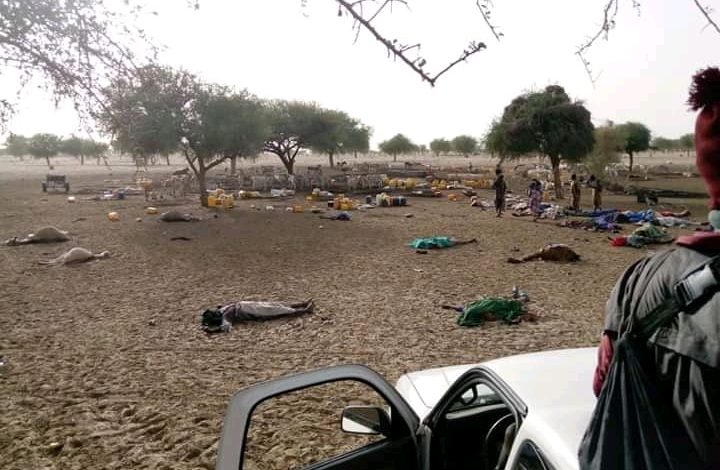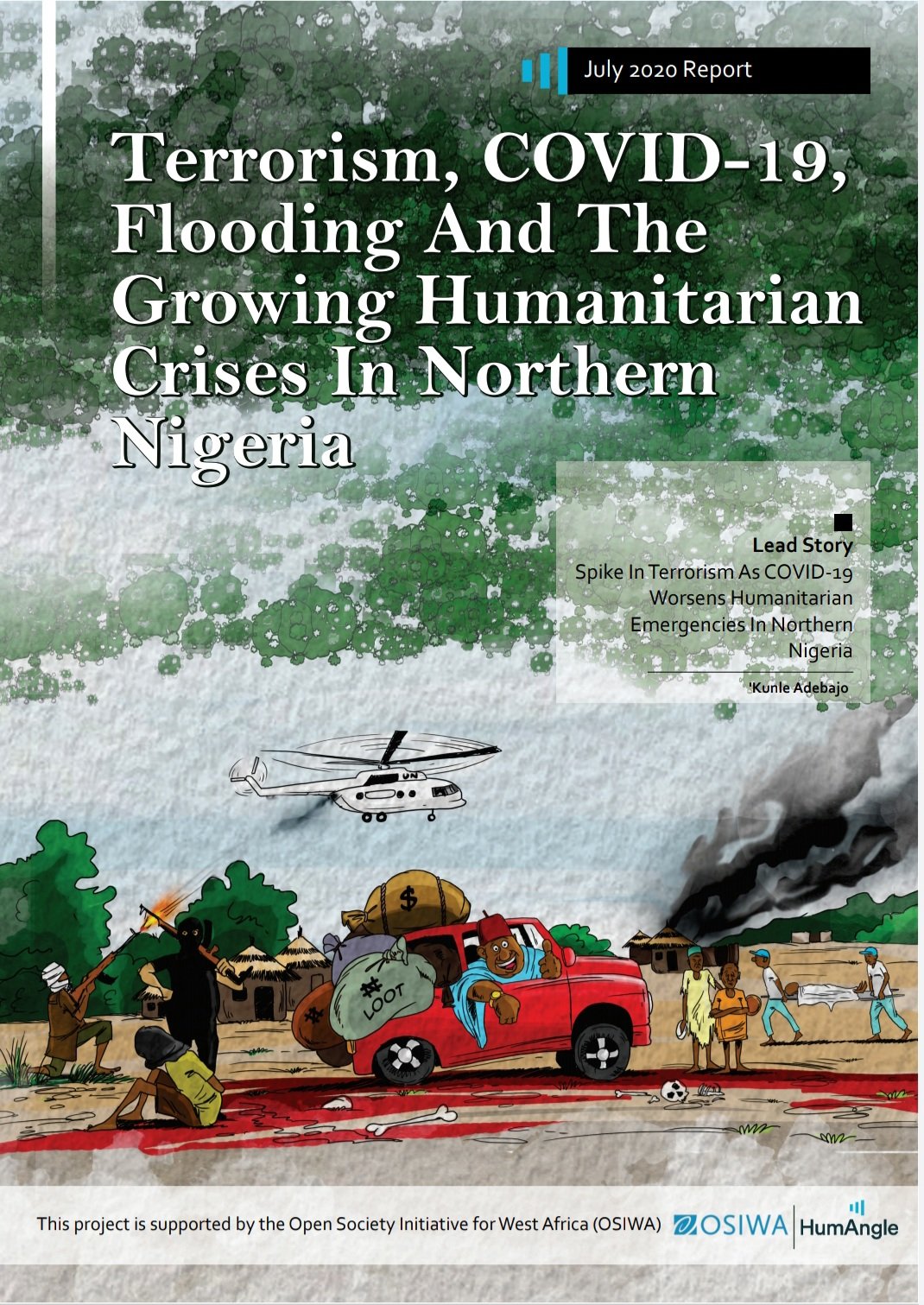Insecurity in Northwest Nigeria Exporting Humanitarian Crisis To Niger Republic

In the last half a decade, the Northwest region has been facing severe insecurity issues. Banditry erupted across some communities affecting a significant population living in Zamfara, Katsina and Sokoto states.
This crisis has forced over 70,000 community dwellers in those states to flee, crossing the border into Niger Republic to seek refuge.
The violence began in 2014 as cattle rustling activity, and the matter became worse in early 2016 when the bandits started killing local miners in communities of Zamfara State and expatriates working with them.
Hassan Zurmi is a resident of Zurmi Local Government seeking refuge in Garin Kaka Opportunity Village in Maradi, Niger Republic. HumAngle spoke with him about his condition, and he said “before the incident, we were living peacefully with all sorts of people not only in Nigeria but Nigeriens at the border areas.
“Fulani herders were doing their normal rearing of animals. They always passed through our farmlands. Sometimes we cracked jokes with them. We bought their animals. We also engaged in barter. They provided us with fresh milk, rams and other livestock while we provided them food for their animals,” he added.
The attacks, which began like child’s play in some communities of Zamfara State, have changed everything. They have spread like wildfire affecting the entire Northwest region, especially those at the border area with Niger Republic with recurring tragedy as thousands are killed.
Women are raped, several of them are forced to become widows. Children are turned into orphans. Villages have been burnt down, sacked and destroyed, while cattle are rustled, farm produce destroyed, properties stolen and people kidnapped for ransom.
The former Governor of Zamfara State, Abdulaziz Yari, is reported to have said that nearly 500 villages and 13,000 hectares of land were destroyed and 2,835 people killed between 2011 and 2018.
In late 2018, it was estimated that more than 10,000 bandits were controlling several communities, especially in Anka, Zurmi, Birnin Magaji and Shinkafi local government areas of Zamfara State.
It is believed that the criminal gangs camped in eight different locations in the wild forests at the boundary areas with neighbouring states of Katsina, Sokoto as well as at the border with Niger Republic.
The Rugu, Kamara, Kunduma and Sububu forests have become major hideout locations for the gangs from which they carry out their criminal raids on communities in Zamfara State and across the whole of the Northwest region.
From 2019 to date, several operations by the Nigerian Army such as ‘Operation Harbin Kunama,’ ‘Operation Puff Adder,’ ‘Operation Diran Mikiya’ and the recently launched ‘Operation Exercise Sahel Sanity,’ were each hyped as the single inevitable solution to the endemic insecurity in the Northwest. The community dwellers have seen the fizzling and end of each ‘operation’, but the problem has remained assertive.
There is no consensus on what originally triggered the insecurity. What is not in contention though is that the crisis has been long drawn and that it is verging on humanitarian emergencies of very tragic dimension.
Usman, a resident of Magama village, a border community between Nigeria and Niger Republic, remembers that “there were pockets of hit and run, armed smuggling and drug business gangs at the border areas but the issue became aggravated as the areas began to witness less rainfall as farming and grazing started running into desperate situations.
“We can trace the origin of the conflict back to when Jibia Dam started drying up. Most Fulani herders use the dam to get water for their cattle and rear animals in the communities of Zamzam, Mazanya Yar Gamji, Mallamawa,” he said.
Usman added: “They started having issues with the communities because they occupied their farmlands, denying the villagers access to their farmlands.”
Foreseeing the aggravating situation, the United Nations High Commissioner for Refugees (UNHRC), opened a sub-office in Maradi, Niger Republic in September 2019. The office coordinates registration, protection, education, health, housing and access to WASH (Water Sanitation and Hygiene) and getting refugees settled.
The Maradi office of UNHCR told HumAngle in April that over 23,000 people from Northwest Nigeria fled into Niger Republic in search of safety. These were people whose ancestral homes had been razed by armed men across the most volatile states in the region.
The office also keeps a record of over 70,000 Nigerians who have fled and are living as refugees in Niger Republic and records that the first influx was in April 2019.
HumAngle spoke with Hamisu and who is from Buzu town in Isa Local Government Area of Sokoto State but now in a refugee camp in Niger Republic. He remembers that first wave of fleeing Nigerians pouring into the neighbouring country.
“At the time we were doomed with this calamity. It was on the first day of Ramadan (April 2019). It was around 7 p.m. Suddenly, we saw a heavily armed group riding motorcycles. The gang stormed our community and started shooting.
“We ran off together with our families whereas some didn’t even know the whereabouts of their family members,” Hamisu recalled.
Women and children still bear some scars of the attacks, such as Bilkisu, a widow who fled with her 11 children from Garin Bawa of Isa Local Government Area of Sokoto State.
She said, “we managed to carry our children and started running to safety with no idea where we were going. Our men couldn’t help us and didn’t know what to do. It was very tragic and traumatic. It was in the night.
“It was a long journey of uncertainty. We went through bushes. We trekked more than four hours in the bush until we arrived at Dankano town in Niger Republic.”
Hamisu explained the difficulty the men faced in the escape journey, saying: “Men, in particular, couldn’t wait to support anyone because we were warned that whoever stopped would certainly lose his life.”
HumAngle learnt that more than 3,000 villagers fled Isa Local Government Area that night.
“We were warmly received at Dan Kano town and given where to sleep and what to eat. Our number could not be estimated, but I can roughly say we were about 3,000,” Bilikisu recalled.
Musa Sale, a resident of Burugusuma community and the only surviving person in his clan, recounted that “all of us trekked to the border town. On the way, many little children were discovered. Some more children were found later when a group of young people volunteered to search for them.”
This conflict has generated a severe humanitarian crisis in Niger Republic. Maradi, like several major communities in the Lake Chad Basin, is creating a location of intervention for the aggravating humanitarian emergencies of the Sahel as the region contends with a refugee crisis amid the global coronavirus pandemic.
Not surprisingly, Babar Baloch, an official of the UNHCR revealed in a recent statement that “the conflict generated a lot of suffering and straining humanitarian actor’s financial resources and capacity to respond.”
Will there ever be re-integration?
As the canvass of the violence and insecurity widens in the Northwest, more communities are likely to be affected with a resulting upsurge in the refugee crisis. It is estimated that hundreds of Nigerians from states in Northwest Nigeria flee daily.
Of the over 70,000 Nigerians living in refugee camps in Niger Republic, 85 percent of whom are women and children, are there any hopes of restoring peace in their homes and getting them back to their communities?
“The people that brought us here really tried but we are worried because whoever leaves his country doesn’t think of anything except how to go back home,” philosophised Hamisu while contemplating reintegration in a conversation with HumAngle.
Mallam Amadu, also from Sokoto State, told HumAngle: “We can’t go back to our communities because we are always conversant with the situation in Nigeria. The gangs are still occupying our houses and farmlands, and there is no security and no plans to dislodge them.
“We feel more at home here despite some challenges. Niger Republic is safer and more comfortable for us than in our country home,” he said.
“Our hosts, the Nigeriens, integrated with us very well. They are very hospitable, they agree to marry our daughters and even allow us to marry them. So, we are leaving happily with them here,” Amadu said.
Sa’adatu Tanko from Sabon-Birni lost her husband and three sons during attacks by armed gangs. She spoke with HumAngle, pitching a very sorrowful tone.
Continue reading …
Support Our Journalism
There are millions of ordinary people affected by conflict in Africa whose stories are missing in the mainstream media. HumAngle is determined to tell those challenging and under-reported stories, hoping that the people impacted by these conflicts will find the safety and security they deserve.
To ensure that we continue to provide public service coverage, we have a small favour to ask you. We want you to be part of our journalistic endeavour by contributing a token to us.
Your donation will further promote a robust, free, and independent media.
Donate HereStay Closer To The Stories That Matter






